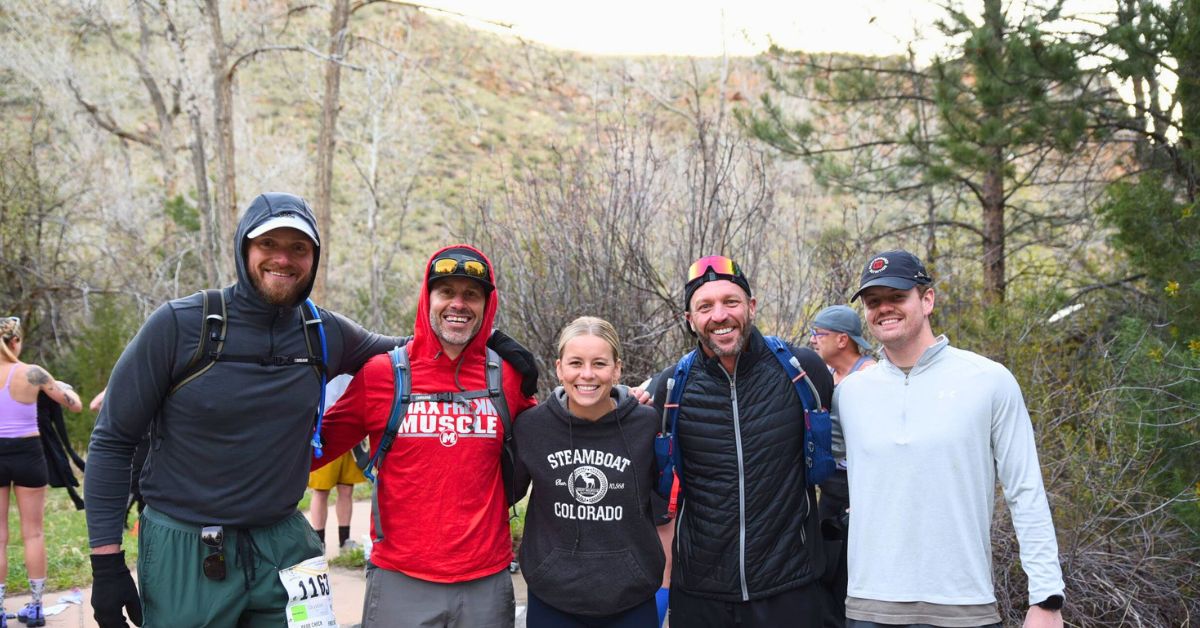Making a New Year’s resolution to improve your running can feel exciting — but sticking to it? Sometimes, following through can be a real challenge. The motivation to push forward, especially with something physically demanding like marathon training, can fade quickly. To succeed, it’s important to set achievable goals and plan ahead. Here’s a guide on how to stick with your plans, achieve your running goals in the new year, and make this your best running year.

Set Realistic and Specific Goals
Vague goals like “run more” or “get faster” may not keep you on track. They’re too open-ended, making it easy to lose focus. Setting clear, specific, and actionable goals will give your training purpose and direction.
Define Your Target Race and Time
Want to tackle a marathon this year? Start by choosing a specific race distance and setting a realistic finish time that aligns with your fitness levels. For example, if you’re eyeing the Colorado Marathon, research the Full Marathon course and consider your current running ability. If you’ve just started long-distance running, aiming for a marathon under four hours might be ambitious. Instead, try focusing on simply crossing the finish line, which is a huge achievement!
What’s more, if you want to run a marathon but feel that a shorter distance might be best, start there to increase your speed, build endurance, and hit new PRs. The Colorado Marathon has four distances making it the perfect race for runners of all levels and abilities. Try the half-marathon, which is half the distance with all the glory! Or, if you’re just starting your running journey, the 10k or 5k are both great options. Explore our Tips for First-Time Marathon Runners to keep in mind while you’re training.
When setting your goal, consider your current fitness level, injury history, and weekly mileage. Goals should challenge you, but they should also be achievable to avoid burnout, frustration, and injury.
Create a Training Schedule
Once you’ve locked in your goal, create a plan to get there. A well-structured training schedule lays out your weekly runs, rest days, long runs, and workouts. For beginners, start with three to four runs per week to build consistency. More experienced runners might add speed work or hill training to boost performance.
With that said, don’t skip recovery days. Rest is just as important as the miles you log. Ignoring rest can lead to overtraining, fatigue, and injury — none of which help you reach your finish line.

Stay Accountable
It’s easier to stay committed to your goals when you have support. Accountability can make the difference between running outdoors on a cold morning or hitting “snooze” on your alarm. Here are a few simple tips to try:
Find a Running Buddy or Group
Running with others is great for motivation, especially during tough workouts. A running buddy will push you to keep going when you’re ready to call it quits. Running groups are also a way to meet like-minded people who share your enthusiasm for the sport.
If you’re training for the Colorado Marathon, check out local running groups or social media communities specific to your area. Many groups organize weekly runs, and the camaraderie can keep you engaged.
Track Your Progress
Logging your runs helps you see the bigger picture and celebrate how far you’ve come. Use a fitness app like Strava or Garmin Connect to track your mileage, pace, and elevation. Prefer old-school methods? Write down your runs in a journal.
Seeing improvements over time — whether it’s running farther, faster, or just feeling more comfortable on long runs — can spark motivation and keep you moving forward.
Prioritize Self-Care
Running is a physically intense sport that can put a great deal of stress on the body. Whether you’ve completed 10 marathons or are preparing for your first 5K, having a solid self-care routine is important to prevent injuries. Check out this self-care resource to help keep you healthy and happy during your training.

Overcome Common Obstacles
No matter how well you plan, challenges will arise. The key is being prepared to tackle them. Here are a few things to keep in mind to help you tackle common challenges:
Dealing With Weather Conditions
Training for a marathon in Colorado means dealing with unpredictable weather. One day could bring sunshine; the next, snow or wind. Dress smart by layering your gear. Breathable base layers, wind-resistant jackets, and moisture-wicking fabrics are essential for winter runs. Don’t forget gloves and hats to protect exposed skin. Need to upgrade your running gear for the new year ahead? Visit our friends at Runners Roost Fort Collins to find the latest gear to keep you comfortable during your training.
When the weather makes outdoor running unsafe, move your workout indoors. A treadmill isn’t the same as running outside, but it’ll keep your training consistent on bad days. Check out these 4 Fun Alternatives to Running Outdoors in Winter to keep you active when it’s too cold to run.
Preventing Injury
Running injuries like shin splints, runner’s knee, and plantar fasciitis can derail your progress. Prevent injuries by doing dynamic stretches before running and static stretches after. Pay attention to your form as you run — landing softly, keeping your shoulders relaxed, and maintaining a steady cadence can reduce strain on your joints. Explore these Tips for Running Downhill Like a Pro from our friends at Colorado in Motion to keep you safe while you run.
Also, know when to back off. A little soreness is normal when increasing mileage, but sharp or persistent pain is a red flag. Listen to your body before a minor issue turns into a major setback.
Maintain a Good Mindset
Marathons test both your body and mind. They require physical strength, endurance, mental toughness, determination, and focus. It’s important to develop and use mental strategies alongside your physical training. Whether you’re preparing for the Colorado Marathon in Fort Collins or participating in a shorter race elsewhere, these Mental Strategies for Marathon Success can help you prepare your mind as you train.

Celebrate Your Achievements
Acknowledging your progress isn’t just good for morale — it’s essential for staying motivated long-term. Each step forward brings you closer to your goal and these achievements must be celebrated. Here are a few tips to keep in mind:
Set Mini-Goals Along the Way
Big goals, like running a marathon, can feel overwhelming. Break it down into smaller milestones. These could include running your first 5K, hitting a weekly mileage target, or setting new PRs. Completing these “mini-goals” will boost your confidence and make the ultimate goal feel more attainable.
For example, if you’re new to marathon training, aim to run three days a week consistently for a month. Once that’s a habit, increase your running frequency, or tackle longer distances or speed drills.
Use Rewards for Motivation
Treat yourself when you reach a milestone. Rewards don’t have to be extravagant. New running shoes, a relaxing massage, or even a favorite meal can make your hard work feel worthwhile. Just make the reward meaningful to you — something that pushes you to keep going.
You’ve Got This!
Running success starts with clear, attainable goals, smart planning, and a little grit. Set realistic and specific goals for yourself, create a balanced training schedule, and find ways to stay accountable. When obstacles arise, tackle them head-on with preparation and flexibility. Celebrate your progress — both big and small — and trust that every step of the process will bring you closer to your resolution.
This year, make your running resolution more than a promise. Make it the start of something bigger: a running journey you’ll be proud of continuing beyond the new year. So lace up, hit the pavement, and make your goals a reality. You’ve got this! Happy New Year from your friends at the Colorado Marathon and we can’t wait to see you at this year’s race!